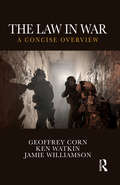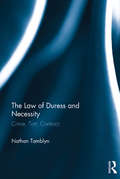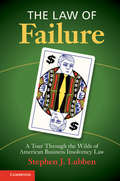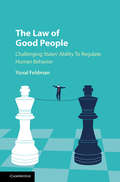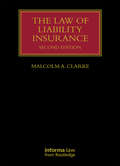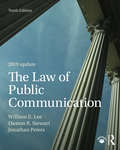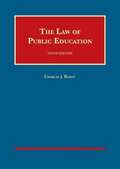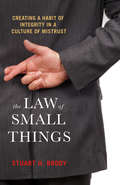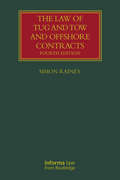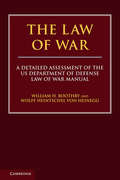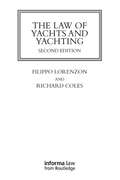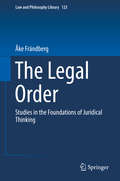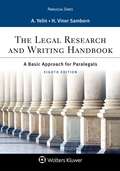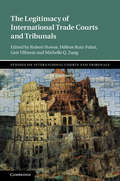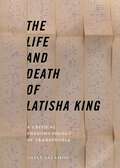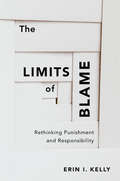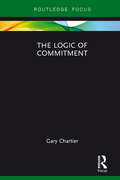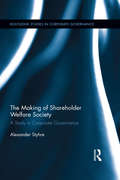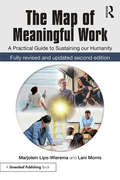- Table View
- List View
The Last Trial (McMurtrie and Drake Legal Thrillers #Book Three)
by Robert BaileyFormer law professor Tom McMurtrie has brought killers to justice, and taken on some of the most infamous cases in Alabama’s history. Now he’s tackling his greatest challenge. <p><p>McMurtrie’s old nemesis, Jack Willistone, is found dead on the banks of the Black Warrior River. Willistone had his share of enemies, but all evidence points to a forgotten, broken woman as the killer. At the urging of the suspect’s desperate fourteen-year-old daughter, McMurtrie agrees to take the case. <p><p>But as seasoned as McMurtrie is, even he isn’t prepared for how personal and dangerous this case is going to get. With the trial drawing near and his sharp young partner, Rick Drake, dealing with a family tragedy, he recruits his best friend, Bocephus Haynes, to help investigate. <p><p>As key witnesses disappear and old demons return, time becomes McMurtrie’s most fearsome opponent. Soon loyalties will be tested and the boundaries of law will be broken as McMurtrie fights to save his legacy—and his client’s life—before the truth is buried forever in the muddy waters of the Black Warrior.
The Law Of Criminal Investigations: A College Casebook (Higher Education Coursebook)
by Joshua Dressler Stephanie Mizrahi George Thomas IIIThis newly designed casebook provides the perfect balance between the challenges of the case method and the needs of undergraduate and graduate students who may, or may not, be headed to law school. The Law of Criminal Investigations: A College Casebook makes use of many of your favorite U.S. Supreme Court cases; edited to reflect the needs of undergraduate students, with Notes and Questions that help illuminate the case and show how it works in the real world. Also included are narratives and summaries that explain and synthesize some of the more complicated legal nuances found in the world of criminal procedure. Written by renowned law professors and authors, Joshua Dressler and George Thomas, who are now joined by Dr. Stephanie Lipson Mizrahi, this book will appeal to all criminal procedure teachers who want to offer their students more in-depth coverage and analysis of this important topic.
The Law in War: A Concise Overview
by Jamie Williamson Geoffrey Corn Ken WatkinThis book provides a comprehensive yet concise overview of key issues related to the regulation of armed hostilities between States, and between States and non-State groups. Coverage begins with an explanation of the conditions that result in the applicability of international humanitarian law, and then subsequently addresses how the law influences a broad range of operational, humanitarian, and accountability issues that arise during military operations. Each chapter provides a clear and comprehensive explanation of humanitarian law, focusing especially on how it impacts operations. The chapters also highlight both contemporary controversies in the field and potentially emerging norms of the law. The book is an ideal text for students studying international humanitarian law for the first time, as well as an excellent introduction for students and practitioners of public international law and international relations.
The Law of Duress and Necessity: Crime, Tort, Contract
by Nathan TamblynThe language of duress and necessity is found in crime, tort and contract. This book explores those pleas, in both case law and theory, across the subject boundaries, and across jurisdictions. In doing so, it seeks to identify the lessons which each area of law can learn from the others, and to tease out common themes while demarcating important differences. The overall outcome is a law more coherent and understood in sharper detail. This book considers the law of England and Wales, Australia, New Zealand, Hong Kong and Canada, as well as the American tortious defence of necessity.
The Law of Failure: A Tour Through the Wilds of American Business Insolvency Law
by Stephen J. LubbenIf a broker-dealer liquidates in federal bankruptcy court, why does an insurance company liquidate in state court, and a bank outside of court altogether? Why do some businesses re-organize under state law 'assignments', rather than the more well-known Chapter 11 of the Bankruptcy Code? Why do some laws use the language of bankruptcy but without advancing policy goals of the Bankruptcy Code? In this illuminating work, Stephen J. Lubben tackles these questions and many others related to the collective law of business insolvency in the United States. In the first book of its kind, Lubben notes the broad similarities between the many insolvency systems in the United States while describing the fundamental differences lurking therein. By considering the whole sweep of these laws - running the gamut from Chapter 11 to obscure receivership provisions of the National Bank Act - readers will acquire a fundamental understanding of the 'law of failure'.
The Law of Good People: Challenging States' Ability To Regulate Human Behavior
by Yuval FeldmanCurrently, the dominant enforcement paradigm is based on the idea that states deal with 'bad people' - or those pursuing their own self-interests - with laws that exact a price for misbehavior through sanctions and punishment. At the same time, by contrast, behavioral ethics posits that 'good people' are guided by cognitive processes and biases that enable them to bend the laws within the confines of their conscience. In this illuminating book, Yuval Feldman analyzes these paradigms and provides a broad theoretical and empirical comparison of traditional and non-traditional enforcement mechanisms to advance our understanding of how states can better deal with misdeeds committed by normative citizens blinded by cognitive biases regarding their own ethicality. By bridging the gap between new findings of behavioral ethics and traditional methods used to modify behavior, Feldman proposes a 'law of good people' that should be read by scholars and policymakers around the world.
The Law of Liability Insurance (Lloyd's Insurance Law Library)
by Malcolm A. ClarkeNow it its second edition, this book is an authoritative and comprehensive review on all aspects of the law that relate to liability insurance contracts. It aims to cover the all the major types of liability insurance, not just professional indemnity insurance, and presents the issues according to the general principles of contract law. Updated to include the impact of the Insurance Act 2015, the book takes a comparative view of the law, tailored to those professionals operating in a global economy, as well as academics and post-graduate students.
The Law of Public Communication
by William E. Lee Kent R. Middleton Daxton R. StewartNow in its tenth edition, The Law of Public Communication provides an overview of media law that includes the most current legal developments. It explains the laws affecting the daily work of writers, broadcasters, PR practitioners, photographers, and other public communicators. By providing statutes and cases in an accessible manner, even to students studying law for the first time, the authors ensure that students will acquire a firm grasp of the legal issues affecting the media. This new edition features color photos, as well as breakout boxes that apply the book’s principles to daily life. The new case studies discussed often reflect new technologies and professional practices.
The Law of Public Education
by Charles J. RussoThe Tenth Edition of this textbook-casebook incorporates recent developments in K-12 Education Law into its conceptual framework by offering updated analysis of major topics in the field. The Tenth Edition added more than 500 case citations since 2014 along with substantive discussions of many of these suits. In addition, the book includes five new case excerpts of opinions on cutting edge issues addressing state aid to faith-based educational institutions in Chapter 2; whether communications by school board members via e-mail messages violate a state’s open meetings law in Chapter 4; the extent to which school boards may promote ballot initiatives in Chapter 4; transfer rules impacting student-athletes in interscholastic sports in Chapter 12; and the level of services school boards must provide students with disabilities in Chapter 15. Citations continue to include references to West’s Education Law Reporter, thereby making it easier for instructors, students, practitioners, and other readers to locate cases and materials.
The Law of Small Things: Creating a Habit of Integrity in a Culture of Mistrust
by Stuart H. BrodyWe are living in a time when dishonesty and duplicity are common in our public institutions, our workplaces, and even in our personal relationships. But by recognizing and resisting the small, seemingly inconsequential ways we make moral compromises in our own lives, we can repair the tear in our social and moral fabric.The Law of Small Things begins with an IQ (Integrity Quotient) test designed to reveal the casual way we regard our promises and the misconceptions we have about acting truthfully. The book shows how most people believe that integrity is something we "just have" and that we just do, like a Nike commercial. It depicts these and other deceptions we deploy to appear to act with integrity without actually doing so. The Law of Small Things also exposes how our culture encourages breaches of integrity through an array of "permitted promise-breaking," a language of clichés that equates self-interest with duty, and the "illusion of inconsequence" that excuses small breaches with the breezy confidence that we can fulfill integrity when it counts. Brody challenges the prevailing notion that integrity is a possession you hold permanently. No one "has integrity" and no one is perfect in practicing it. What we have is the opportunity to uphold promises and fulfill duties in each situation that faces us, large and small. Integrity is a practice and a habit of keeping promises, the ones we make explicitly and the ones that are implied in all our relationships. Ultimately, developing skill in the practice of integrity leads us to knowledge of who we are--not in the way the culture defines us, but in the way we truly know ourselves to be.
The Law of Tug and Tow and Offshore Contracts (Lloyd's Shipping Law Library)
by Simon RaineyFully updated and revised to take into account the new BIMCO Supplytime 2017 contract with a detailed analysis of the changes since the Supplytime 2005 form and including a new analysis, for the first time, of the BIMCO Bargehire form, this is the only modern work on the law of towage and offshore vessel services. It gives a comprehensive and extensively researched account of the general law coupled with a detailed clause-by-clause commentary and analysis of all of the major standard contracts used in the international offshore, towage and heavylift sectors, comprising the BIMCO Towcon, Towhire, Supplytime and Heavylift forms, the full suite of BIMCO Wreck Removal forms and, now, also the BIMCO Bargehire form, as well as the ISU Salvcon and Salvhire forms. The Law of Tug and Tow and Offshore Contracts has rapidly established itself as a leading text and is written by, Simon Rainey QC, one of the foremost shipping practitioners with unrivalled experience in the field. Key reasons to buy The Law of Tug and Tow and Offshore Contracts, Fourth Edition • the only clause-by-clause commentary on all of the major standard form contracts used by the offshore industry • the only in-depth analysis of the drafting history of the BIMCO standard form offshore contracts, comparing the recent amended versions in their drafting context; • the only authoritative analysis of the case law and arbitration decisions affecting the towage and offshore industries • written from the perspective of a leading practitioner with unrivalled practical experience over many years of the contract forms and of the issues which arise under them (many of which are unreported) and involved in almost all of the leading cases and arbitrations in the field • written with an eye on the practicalities of how the contracts work given the everyday problems which arise in the industry, with guidance where the standard forms may require amendment
The Law of War: A Detailed Assessment of the US Department of Defense Law of War Manual
by William H. Boothby Von Heinegg Wolff HeintschelIn 2015, the United States Department of Defense published its long-awaited Law of War Manual making a significant statement on the position of the US government on important military matters. Whilst readers recognise the Manual's legal and strategic importance, they may question whether particular statements of law are legally accurate or complete. This book offers a unique in-depth review of the complete Manual, including revisions, on a paragraph-by-paragraph, line-by-line and word-by-word basis. The authors offer their personal assessment of the DoD's declared view as to the law that regulates the conduct of warfare, a subject of unparalleled current importance. William H. Boothby and Wolff Heintschel von Heinegg offer a balanced, articulate and authoritative critique for readers perusing the Manual in whatever capacity.
The Law of Yachts & Yachting (Maritime and Transport Law Library)
by Richard Coles Filippo LorenzonNow it its second edition, The Law of Yachts and Yachting is a comprehensive treatise on the law relating to yachts and provides its readers with a thorough analysis of maritime law as relevant to the superyacht sector. Written by a team of leading yachting practitioners and researchers, it covers the legal issues arising during the life of a yacht. The book is written for the legal practitioner, yacht-broker and manager concerned with the operation of professionally crewed yachts including financing, registration, chartering, insurance, compliance and casualty management. Key Features - •The only practitioners’ book on the area •It covers all major aspects of yachting law in a single book •The Law of Yachts and Yachting is highly comprehensive - despite its main focus on contract and tort law, it contains references to public law and international law and practice •References to case law, English, foreign and international •Appendices containing essential source materials The second edition will cover important changes in the superyacht industry such as: the new MYBA Charter Form 2017, the Large Yacht Code (LY3) and the Passenger Yacht Code, both shortly to be consolidated into the new REG-YC, and the coming into force of the Maritime Labour Convention 2006, to name just a few.
The Law: A Guide for Lovers of Art and Antiques (In Plain English)
by Leonard DuBoff Sarah Tugman“Savvy art collectors who want to protect themselves and their investments would be wise to read The Law (in Plain English)® for Collectors. The book provides valuable guidance that collectors of all levels can rely on.” —Dale Chihuly In The Law (in Plain English)® for Collectors, Leonard DuBoff and Sarah Tugman provide helpful advice on all things legal when it comes to art, antiques, and other collectibles. Whether readers are into coins or Queen Anne furniture, paintings or vintage books, this guide contains useful and practical information readers need to know to protect and enjoy their collections. Among other important concerns, readers will learn how to: Navigate purchases and customs Select insurance plans Properly file taxes Loan out pieces to galleries, museums, and shows Bestow work to future generations For private collectors, gallerists, artists, and others interested in art dealings, The Law (in Plain English)® for Collectors is an indispensable reference.
The Legal Environment of Business: Text and Cases
by Roger Miller Frank CrossComprehensive, authoritative, and cutting-edge, THE LEGAL ENVIRONMENT OF BUSINESS combines a classic black letter law approach with an interesting and accessible reader-friendly format. The cases, content, and features of the exciting new Tenth Edition have been thoroughly updated to represent the latest developments in the business law environment. An excellent assortment of cases ranges from precedent-setting landmarks to important recent decisions. Ethical, global, e-commerce, digital, and corporate themes are integrated throughout; for example, new Digital Update features affecting the law are included throughout this edition.
The Legal Order: Studies in the Foundations of Juridical Thinking (Law and Philosophy Library #123)
by Åke FrändbergIn this monograph a fundamental distinction is made between law and juridical thinking. Law is the content of legal rules and the systems of legal rules. Juridical thinking is the handling of the law by the lawyers. To this distinction corresponds a basic distinction between the language of law and the language of juridical thinking, and correlatively, between L-concepts (law concepts) and J-concepts (juridical or jurisprudential concepts). The monograph is devoted to the J-concepts, especially of technical (not ideological or evaluative) J-concepts. Four kinds of J-concepts are investigated: morphological J-concepts, those that help us to structure the law in a logical and functional way; topological J-concepts, those that help us to indicate the phenomena to which the law is applicable, and to separate the areas of application for different legal systems; praxeological J-concepts, those that help us to explore the relations between law and action, and methodological J-concepts, those that help us to describe the methods of the professional-juridical handling of the law. The work can be characterised as presenting a lawyer´s philosophy of law.
The Legal Research and Writing Handbook: A Basic Approach for Paralegals (Aspen Paralegal)
by Andrea B. Yelin Hope Viner SambornWith clear explanations, examples, and visual aids, The Legal Research and Writing Handbook, Eighth Edition by Andrea Yelin and Hope Viner Samborn offers complete coverage of a complex subject in a student-friendly, accessible text. In this thoroughly updated new edition, the authors continue to keep pace with legal research, citation, and technology in today’s law firms. This practical text focuses on efficient research processes and techniques for both traditional and electronic sources, along with step-by-step instruction through each stage of the legal writing process, from prewriting strategies, to revising. The text is enhanced with examples and visual aids, expert writing and practice tips, hands-on exercises, ethics alerts, up-to-date web resources, and easy-to-navigate page design. Excellent exercises are provided to reinforce student learning. <P><P> Key Features: <li>Updated and expanded coverage of electronic resources reflecting how paralegals do research today <li>Detailed discussion of how to use legal authorities in legal communications and how to synthesize them and present them to attorneys <li>Examples, exhibits, practical tips, updated exercises, and web resources in every chapter <li>Expanded discussion of e-mail and e-memos <li>In-depth coverage of the IRAC method, as well as how to write legal memoranda and legal correspondence
The Legitimacy of International Trade Courts and Tribunals (Studies on International Courts and Tribunals )
by Geir Ulfstein Robert Howse Ruiz-Fabri Hélène Michelle Q. ZangThe recent rise of international trade courts and tribunals deserves systemic study and in-depth analysis. This volume gathers contributions from experts specialized in different regional adjudicators of trade disputes and scrutinizes their operations in the light of the often-debated legitimacy issues. It not only looks into prominent adjudicators that have played a significant role for global and regional integration, but it also includes the newly established and/or less-known judicial actors. Critical topics covered range from procedures and legal techniques during the adjudication process to the pre- and postadjudication matters in relation to forum selection and decision implementation. The volume features cross-cutting interdisciplinary discussions among academics and practitioners, lawyers, philosophers, and political scientists. In addition to fulfilling the research vacuum, it aims to address the challenges and opportunities faced in international trade adjudication.
The Life and Death of Latisha King: A Critical Phenomenology of Transphobia (Sexual Cultures #10)
by Gayle SalamonWhat can the killing of a transgender teen can teach us about the violence of misreading gender identity as sexual identity?The Life and Death of Latisha King examines a single incident, the shooting of 15-year-old Latisha King by 14-year-old Brian McInerney in their junior high school classroom in Oxnard, California in 2008. The press coverage of the shooting, as well as the criminal trial that followed, referred to Latisha, assigned male at birth, as Larry. Unpacking the consequences of representing the victim as Larry, a gay boy, instead of Latisha, a trans girl, Gayle Salamon draws on the resources of feminist phenomenology to analyze what happened in the school and at the trial that followed. In building on the phenomenological concepts of anonymity and comportment, Salamon considers how gender functions in the social world and the dangers of being denied anonymity as both a particularizing and dehumanizing act. Salamon offers close readings of the court transcript and the bodily gestures of the participants in the courtroom to illuminate the ways gender and race were both evoked in and expunged from the narrative of the killing. Across court documents and media coverage, Salamon sheds light on the relation between the speakable and unspeakable in the workings of the transphobic imaginary. Interdisciplinary in both scope and method, the book considers the violences visited upon gender-nonconforming bodies that are surveilled and othered, and the contemporary resonances of the Latisha King killing.
The Life of Sir Edward Marshall Hall: The Life Of Sir Edward Marshall Hall
by Edward MarjoribanksTime and again the crowd roared its vehement applause when the magnificent figure of Edward Marshall Hall was seen leaving the Old Bailey after one of his great triumphs as “counsel for the defence.”This lawyer, who appeared in almost every famous murder trial in England during the last forty years, was the very man to catch the public eye. Six feet three inches in height, “the Apollo of the Bar,” passionately eloquent, alert and daring, he was one of the most dynamic and irresistible of advocates who ever pleaded before a jury.This “Memoir” is not only an unusually full picture of the life of a great lawyer; it is also a record of many famous criminal cases. Marshall Hall’s genius for cross examination, his quickness in seizing on a flaw in the prosecutor’s case, his histrionic power, his compassion, and the talent he had for suddenly producing, as if by a conjuror’s trick, a new bit of evidence for which his opponents were totally unprepared—all these qualities come out in clear relief in the sensational trial scenes reproduced here.There is a place for this book in law literature and as the biography of an intensely vivid personality. Moreover, it contains a collection of true stories of crime which would be difficult to match in fiction.
The Limits of Blame: Rethinking Punishment and Responsibility
by Erin I. KellyFaith in the power and righteousness of retribution has taken over the American criminal justice system. Approaching punishment and responsibility from a philosophical perspective, Erin Kelly challenges the moralism behind harsh treatment of criminal offenders and calls into question our society’s commitment to mass incarceration.
The Little Book on Oral Argument
by Alan L. DworskyThis book is a concise, friendly guide to oral argument for law students and new lawyers, designed to introduce and cover its subject in a simple and entertaining, yet comprehensive, way. It contains chapters on such topics as style, substance, structure, questions, and rebuttal to explain effective approaches to this peculiar form of conversation. Second edition updates language and technical advances from the past two decades since the first edition was released.
The Logic of Commitment (Routledge Focus on Philosophy)
by Gary ChartierThis book develops and defends a conception of commitment and explores its limits. Gary Chartier shows how commitment serves to resolve conflicts between ordinary moral intuitions and the reality that the basic aspects of human well-being are incommensurable. He outlines a variety of overlapping and mutually reinforcing rationales for making commitments, explores the relationship between commitment and vocation and the relevance of commitment to love, and notes some reasons why it might make sense to disregard one’s commitments. The Logic of Commitment will appeal to ethicists interested in the connection between commitment and personal well-being, and to anyone who wonders why and when it might make sense to make or keep commitments.
The Making of Shareholder Welfare Society: A Study in Corporate Governance (Routledge Studies in Corporate Governance)
by Alexander StyhreThe Making of Shareholder Welfare Society traces and accounts for the debates and discussions between law and economics scholars and mainstream legal scholars, management theorists, and economic sociologists. This is done in detail to demonstrate that the shareholder welfare society was built from the bottom up, beginning with theoretical propositions regarding alleged market efficiencies and leading all the way to the idea that a society characterized by economic freedom and efficiency maximization pave the way for uncompromised shareholder welfare, in turn being good for everyone. This book is of relevance for a variety of readers, including graduate students, management scholars, policy-makers, and management consultants, as well as those that are concerned about how the economic system of competitive capitalism is now in a position where it is riddled by doubts and concern, not the least as the levels of economic inequality is soaring. It addresses the topics with regard to corporate governance, accounting and society and will be of interest to researchers, academics, students, and members of the general public that are concerned about the economic system of competitive capitalism.
The Map of Meaningful Work (2e): A Practical Guide to Sustaining our Humanity
by Marjolein Lips-Wiersma Lani MorrisThis book introduces the Map of Meaning which provides a clear, simple and profound framework of the dimensions and process of living and working meaningfully. The Map of Meaning is based on over 20 years' research into the insights and practice of ordinary people as they search for, lose and find meaning. Incorporating the ideas of philosophers, psychologists and sociologists, this book describes how human beings wrestle with, and answer, questions such as, "What gives my life and work meaning?", "How can I balance inspiration and reality and maintain positive momentum?" and "How do we integrate meaningfulness into our workplaces?". Innate human knowledge is captured in a practical model that makes understanding and working with issues of meaning clear and accessible to everyone. At an individual level this book helps people to define and stay in contact with what is most important to them as they grapple with the real problems of daily life. It shows how they can stay in charge of keeping the human search for meaning alive, especially in the face of the challenges that exist in organizational life. Because the dimensions of meaning are shared, the second half of the book focuses on how we can bring an awareness of what creates meaningful work into our thinking about the practice and design of organisations. The authors recognize that in the current economic context a simple, yet profound guide for humanity is essential, precisely because organizational life has become so intensely directed towards a singular economic goal. They argue that it is vital that people have an easy, powerful way to reclaim the significance of meaning in their working lives both individually and at a whole of organization level. Updated with new chapter material and case studies, this second edition offers profound insights for anyone who is interested in creating more meaning and purpose in work and organizations – from a CEO to a blue-collar worker or consultant. It is for those searching for ways to re-energize their roles or change their careers. It is for anyone who firmly believes that it must be possible to align our deeper life purposes with our daily actions in the workplace. It is for anyone who is committed to creating workplaces that support and enable the experience of work that feels worth doing.


